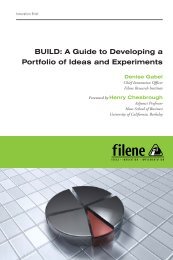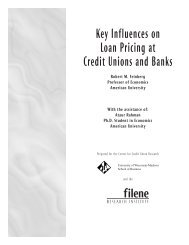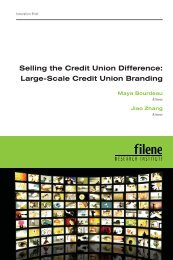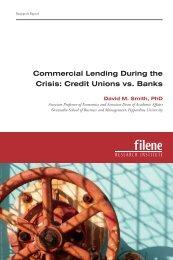Credit Union and Cooperative Patronage Refunds - Filene ...
Credit Union and Cooperative Patronage Refunds - Filene ...
Credit Union and Cooperative Patronage Refunds - Filene ...
Create successful ePaper yourself
Turn your PDF publications into a flip-book with our unique Google optimized e-Paper software.
epayment, <strong>and</strong>/or if the asset is one of those expenditures that<br />
begets more expenditures on other assets to supplement the initial<br />
expenditure, there is no assurance that redemptions can be sped up.<br />
The opposite—that redemptions are slowed down—may, in fact,<br />
be true. But, as between an IOF <strong>and</strong> a co-op, the co-op’s incentives<br />
clearly lean in favor of distributing as much cash as soon as possible<br />
to redeem equity, while the IOF’s incentives clearly lean in favor of<br />
holding on to extra cash <strong>and</strong> reinvesting it in the IOF.<br />
In fact, an expenditure that triples the co-op’s market value does<br />
not hold the same fascination for a co-op that it does for an IOF. A<br />
natural tension occurs among<br />
members in a co-op, where<br />
The counterweight to members who want redemptions of acquiring assets <strong>and</strong> growing<br />
equity is usually that the board of directors has a fiduciary the business necessarily mean<br />
obligation to look out for the co-op’s interest in surviving <strong>and</strong> that cash for rede mptions of<br />
flourishing for future generations.<br />
allocated equity is reduced or<br />
eliminated. This member interplay<br />
pushes management <strong>and</strong><br />
the board of directors to carefully examine asset expenditures because<br />
the leadership knows it will be criticized by members who prefer cash<br />
redemptions of their allocated equity over asset expenditures. The<br />
incentives that an IOF operates under to continue investing in assets<br />
to grow the IOF’s value do not exist in a co-op.<br />
Because a co-op’s strongest <strong>and</strong> most respected members are typically<br />
older, more vocal, <strong>and</strong> experienced <strong>and</strong> hold more allocated equity in<br />
the cooperative, their views often carry more weight 9 than the views<br />
of younger members, who care less about redemption of equity <strong>and</strong><br />
more about the state of the co-op’s competitiveness, its asset bases,<br />
<strong>and</strong> the extent to which it is providing for the needs of members. So<br />
the counterweight to members who want redemptions of equity is<br />
usually that the board of directors has a fiduciary obligation to look<br />
out for the co-op’s interest in surviving <strong>and</strong> flourishing for future<br />
generations.<br />
The only time that a co-op member (or former member) benefits<br />
from the market value of the cooperative is at its dissolution. The<br />
members of the cooperative who purchased an asset tripling the<br />
co-op’s market value would enjoy that added value only if the cooperative<br />
is dissolved, but former members (even members who are<br />
deceased <strong>and</strong> no longer own allocated equity) would also enjoy that<br />
accretion in value because they are all entitled to a portion of the dissolution<br />
distribution after all allocated equity is first redeemed. The<br />
remaining proceeds are distributed to members <strong>and</strong> former members<br />
on the basis of historical patronage, theoretically to former members<br />
12








